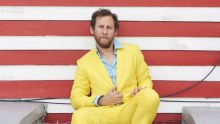'Believe me': Trump asks Americans for blind faith despite long list of trust issues
Updated
"Trust, but verify" was US president Ronald Reagan's maxim, particularly when wrangling with Russians.
"Believe me" is president-elect Donald Trump's choice command when debating almost any topic: the building of border walls, defeating ISIS, denying accusations that he hired Russian prostitutes to urinate in his presence.
As Trump enters the same Oval Office his Republican idol Reagan once occupied, the incoming 45th president of the United States is indeed banking on Americans offering him massive credence - and not so much for Trumpian policies or doctrine as for Trump himself.
Trump has, after all, refused to reveal to a body politic that just endowed him with great power the more intimate details of his business interests, his foreign entanglements and even, at age 70, his health.
Take Trump's federal tax returns — windows into his wealth, charity and potential conflicts of interest that go well beyond annual personal financial disclosures that politicians (including Trump) must by law file.
Trump, in departing from modern presidential precedent, says that Americans don't care "at all" about them. The vast majority of Americans — Republicans included in the lot — have begged to differ, for months saying they'd love to see what Trump's tax returns contain.
Then there's the matter of Trump's very ownership of dozens of businesses with operations in numerous nations — some friends, others frenemies at best, such as Saudi Arabia and China.
Lest we forget that Trump, despite railing against Iran in the most hawkish of terms, once earned $500,000 annually renting space to a state-owned Iranian bank that the US government later determined was funding terrorist organisations, including the Taliban, Hamas and Hezbollah. Or how, with dollar signs in his eyes, he courted former Libyan dictator Muammar Gaddafi.
In November, Trump tweeted that he'd "be leaving my great business in total in order to fully focus on running the country in order to make America great again.
Trump argued that while he was not legally required to do so, "it is visually important, as president, to in no way have a conflict of interest with my various businesses."
Many people interpreted Trump's statement as a pledge to sell off his empire or at least place it in a blind trust, with an independent, dispassionate party running it all. Trump promised to explain it all in a December press conference.
But no.
Trump postposed his press conference. He created no blind trust. And Trump didn't divest of his business holdings, as the US Office of Government Ethics — initially, in an unorthodox flurry of its own Trump-like tweets — has so aggressively advocated he do.
Trump has instead endowed his sons, Donald Jr and Eric, with operational control of the Trump business empire, despite both men serving as the closest of confidants to and advocates for their father.
In this realm, the public most certainly wants more from Trump.
A Center for Public Integrity/Ipsos poll in September, for example, concluded that nearly three in five Americans believed Trump is generally dishonest and opaque when discussing his financial, business and investment dealings.
For those who dare question his pronouncements and motives, particularly members of the "fake news"-peddling "lying, disgusting media" Trump reserves a special brand of spite.
He's blacklisted news organisations.
He temporarily ditched the "protective press pool" — a small group of reporters who chronicle a president's every move, primarily as witnesses to historical events ranging from dignitary visits to assassination attempts and terrorist attacks.
Trump's incoming administration is now threatening to curtail press access in the White House.
And this week, journalists are summarily banned from entering the Trump International Hotel located five blocks from the White House, which is a public facility owned by the federal government. The reason offered: guest privacy.
Disconcerted enough is the White House Correspondents' Association that its president, fearing an erosion of its right to hold elected officials accountable for their words and actions, felt compelled to state in writing that the organisation will be "standing up for the rights of a free press to report vigorously on the new administration."
And what about those Russians?
Trump continues waging a war of words with the federal government's own intelligence apparatus, which has concluded that, yes, the Russia intervened in the 2016 presidential election with the goal of aiding Trump.
Trump repeatedly scoffed such a notion. He called it "ridiculous." Then, last week, Trump acknowledged the Russians did interfere with an election he won on the strength of narrow victories in four US states.
Did Trump's campaign team work with the Russians? Was Trump himself aware of any foreign shenanigans? Do Russians have a mountain of dirt on Trump they're just waiting to dump?
Various government investigators are attempting to find out. Congress itself is investigating the mess, and even some of Trump's fellow Republicans are concerned.
Meanwhile, believe this: Trump will continue to tell Americans to believe him. That's his prerogative.
Trump should likewise trust that Americans will seek to verify his every word, which is theirs.
Dave Levinthal is senior political reporter for the Center for Public Integrity, a nonprofit and nonpartisan investigative news organisation based in Washington, DC.
Topics: world-politics, corruption, ethics, united-states
First posted






